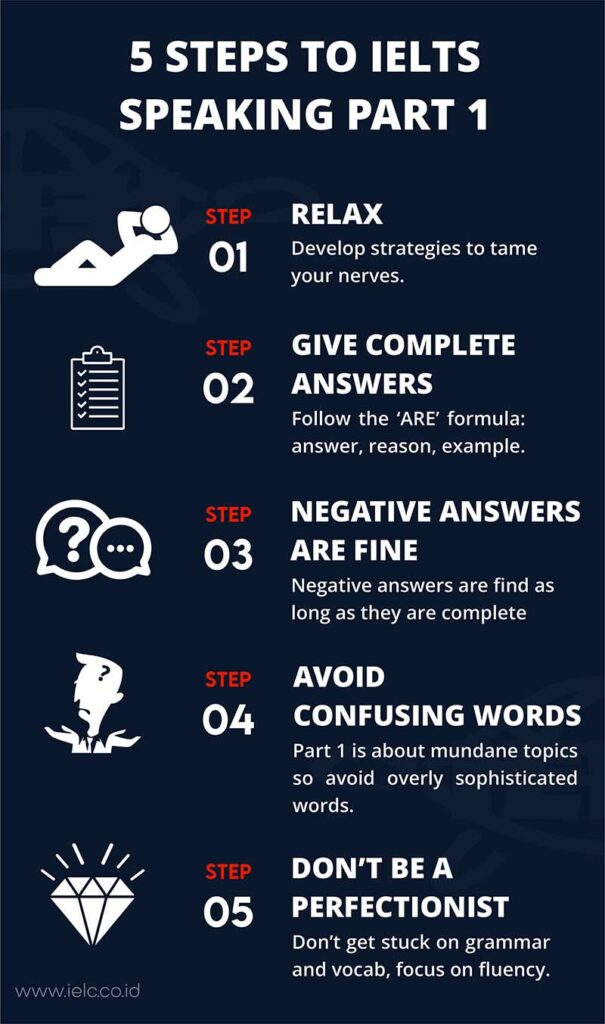
5 things you need to know about IELTS Speaking Part 1
Are you nervous about the IELTS speaking interview?
If so, you’re not alone!
So many of our students in IELTS Course tell us that speaking is the thing they most fear!
In fact, according to many IELTS test takers, the IELTS speaking interview can be even scarier than huge hairy spiders, dangerous snakes & even the dreaded kuntilanak!!!
I know it’s unbelievable but many students fear IELTS speaking even more than those cold, freaky geckos – the infamous tokek….toka-toka-toka-toka-tokaaaaak!!!
So in this article, we teach you how to overcome your fear of dangerous lizards and ghosts and more importantly….IELTS speaking part 1
So why is IELTS speaking part 1 so scary?
Well, let’s find out…actually, it’s not as scary as you might think.
Part 1 of the speaking test only lasts for about 4-5 minutes and the examiner asks you about familiar topics, such as:
- Your family
- Your hometown
- Your job
- Your studies
- Your hobbies
- Your daily routines
Nothing scary about that. Notice that all topics are about you….ahaaa…now it’s getting a little scary.
But overall, it should be easy. Surely you know about yourself… right? Still, it’s good to know what to expect and prepare accordingly.
The introduction
The first part of the interview is the greeting part. Even though this part is not officially “assessed”, it’s important to make a good impression.
When you enter the room, the examiner usually introduces themselves and asks you to introduce yourself.
Hint: Don’t simply say your name or give one word answers:
Examiner: “Good afternoon. What’s your name?”
Test Taker: “Andriyanto”
Examiner: “Hi Andriyanto, how are you today?”
Test Taker: “Fine”
Use full sentences instead:
Examiner: “Good afternoon. What’s your name?”
Test Taker: “Well, my full name is Andriyanto Paryono but most of my friends simply call me Andri, so please just call me Andri”
Examiner: “Thank you Andri, how are you today?”
Test Taker: “Actually, to be honest, I’m really nervous but I’m also kind of excited at the same time. How are you today?”
Notice how we are making this a full conversation.
Hint: Test takers should be doing 80% of the talking. If you simply give one word answers, the examiner is doing 80% of the talking.
Finally, the examiner will ask you to show your identification and the test will begin.
The Test Begins
This is where the fun stuff happens…
In Part 1, the examiner will ask you questions about common topics like your work, study, hometown, home, your family and your friends.
The 4 most common test topics are work, study, hometown and home.
So if you get one of these topics, you might get questions like this:
Work
- What is your job?
- Is it a popular job in your country?
- Do you like your job?
Study
- What are you studying?
- Why did you choose that subject?
- Is it a popular subject in your country?
Hometown
- Can you describe your hometown to me?
- Do you like your hometown?
- What do you like about your hometown?
Home
- Can you describe your home to me?
- What is your favorite room?
- What would you change about your home?
Not so scary after all huh…
Strategies
So what sort of strategies do you need to answer these questions?
Now that you have an idea of the type of questions the examiner will ask you, here are some strategies you will need to know to perform well in Part 1 and get a high speaking score.

1. Relax
We know…you’re probably rolling your eyes now and internally say, “How can I relax? IELTS is so nerve-wracking!”
Well, here’s the thing, if you are too tense, your answers will probably be stiff and short but part 1 is all about assessing your natural speaking ability, so your aim should be to talk naturally and confidently.
Try imagining as though you are talking to a friend. When talking to friends, you’re relaxed and open. This is the perfect mindset to be in during the speaking test.
Take some deep breaths as you enter the room. Calming your nerves is half the battle.
If you are relaxed, you will be more likely to give longer answers, which bring us to our next point.
2. Give nice complete answers
Just as in the introduction, DO NOT simply give “yes” or “no” answers.
If the examiner asks, “Do you like listening to music?” Don’t just answer with “yes”. Expand your answer. Explain why you like listening to music and what kind of music you like. You can use the AREA formula to help you with answering questions from part 1.
A – Answer: Yes, I really love listening to music
R – Reason: The reason I love listening to music is because it puts me in a good mood and even helps me focus when I am doing homework. I’m definitely more productive when I am listening to music in the background.
E – Example: Typically, I listen to instrumental jazz because I find it really soothing and it puts me in a good mood and it also help me focus
A – Answer again: So yes, I love listening to music, it’s very important to me and I listen to it all the time.
Don’t forget, this is a speaking test. So you should be doing most of the speaking. Don’t forget the 80% rule we mentioned above.
3. It’s okay to give negative answers (but make them interesting)
Some test takers seem to think that you must give a positive answer to everything. But negative answers are equally as good so long as they are interesting.
If you are honest about your negative experience, your sentences will flow better since you don’t have to think as much about what you will say.
For example, the examiner might ask: “Do you like what you are studying?”
You can reply: “To be honest, I don’t really like studying computer science. It’s quite boring and tedious because I have to keep working on the same codes over and over. I applied for computer science because I thought it would give me a stable job in the future, but now I wish I had picked something I am actually passionate about.”
Hint: Remember to always show a positive attitude even when you are giving a negative answer. Don’t use your IELTS speaking exam as a therapy session :P
The examiner is not marking you on your opinion. They are assessing your speaking skills. They don’t care if you don’t like your study or your work. As long as you explain the reason well, you have nothing to worry about.
4. Avoid using confusing language
Since part 1 is about mundane topics, using overly sophisticated words can sound unnatural. Compare these answers:
“What is your hobby?”
Answer 1: “I like collecting crystals and reading astrology. I don’t really believe in astrology but the crystals have beautiful colors and go nicely with my room decoration and reading about astrology is fun. I can blame my laziness on a star alignment instead of on myself!”
Answer 2: “I am not sure you will understand, but I find delight in studying the metaphysical properties of precious stones and the significance it has on one’s psyche. I also take pleasure in reading one’s birth chart and finding out which star is causing one’s misfortune”
You can probably guess which one sounds more natural, right?
You can use part 3 of the speaking test to flex your vocabulary muscles but again try not to act more sophisticated than you are – it will sound unnatural.
5. Don’t be a perfectionist
Say what? You’re probably saying, “but I want to achieve a perfect score!”
Here’s the thing, your examiner is not expecting perfection.
Believe it or not, even people who get band 9 for speaking make small mistakes!
Hint: there are 2 types of mistakes in IELTS speaking:
- Slips: you make occasional mistakes and quickly correct yourself. This won’t reduce your score.
- Frequent mistakes: You make a lot of mistakes and repeat the same mistakes. This will reduce your score.
If you are constantly thinking about your grammar and vocabulary, it could adversely affect your fluency and pronunciation. Fluency and pronunciation make up 50% of your marks. So, there is no point getting stuck searching for the perfect word or trying for perfect grammar.
Just speak as naturally as possible. Don’t overthink your sentences. And again, remember that your examiner is not expecting perfection.
Summary
Congratulations on making it this far! Turns out it wasn’t so scary after all.
Certainly not as scary as that terrifying tokek…toka toka toka toka tokeeeeeekkkk!
In this article, we explained the main things you need to know to do well in IELTS speaking Part 1.
We love helping people succeed in IELTS so we hope you found this article useful.
If you find this helpful or know someone who would benefit from this article, we’d really appreciate it if you can share this article with them.
NEXT STEPS
Do you want to achieve your IELTS target?
We just shared the tips and strategies you need to ace IELTS speaking part 1. Armed with these strategies, you can take the first step on the road to achieve your dream IELTS score.
But if you want to guarantee success in your IELTS test…
And
You’re tired of wasting time and money on strategies and courses that don’t work…
And
You’re confused on which IELTS course to take….
Then check out our Indonesia’s best IELTS preparation course to achieve your target IELTS score and embark on the next chapter of your life!
IELC has the best track record in Indonesia for helping our students achieve their IELTS target and we will use our experience and expertise to make sure you will achieve your target too!
P.S. If you are curious about your IELTS score, contact us about our simulation tests complete with feedback for writing and speaking test!
Sincerely,
Anthony McCormick
IELC Managing Director
